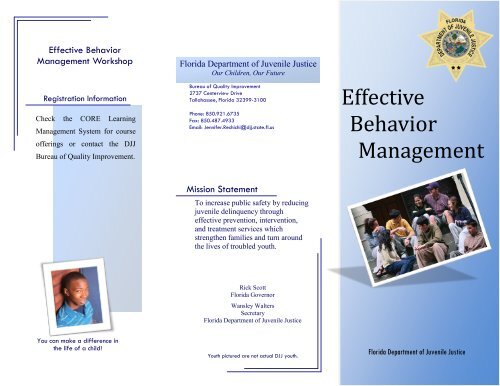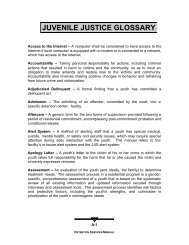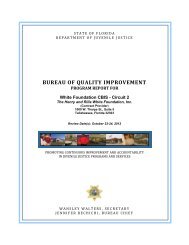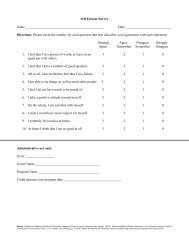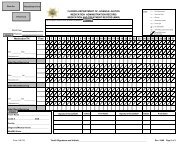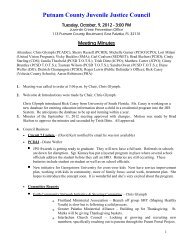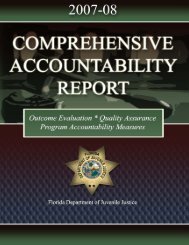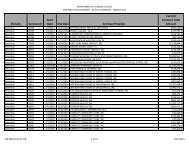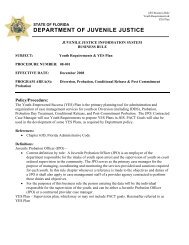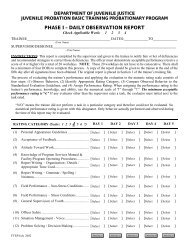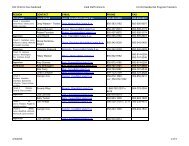Effective Behavior Management - Florida Department of Juvenile ...
Effective Behavior Management - Florida Department of Juvenile ...
Effective Behavior Management - Florida Department of Juvenile ...
Create successful ePaper yourself
Turn your PDF publications into a flip-book with our unique Google optimized e-Paper software.
<strong>Effective</strong> <strong>Behavior</strong><br />
<strong>Management</strong> Workshop<br />
Registration Information<br />
Check the CORE Learning<br />
<strong>Management</strong> System for course<br />
<strong>of</strong>ferings or contact the DJJ<br />
Bureau <strong>of</strong> Quality Improvement.<br />
<strong>Florida</strong> <strong>Department</strong> <strong>of</strong> <strong>Juvenile</strong> Justice<br />
Our Children, Our Future<br />
Bureau <strong>of</strong> Quality Improvement<br />
2737 Centerview Drive<br />
Tallahassee, <strong>Florida</strong> 32399-3100<br />
Phone: 850.921.6735<br />
Fax: 850.487.4933<br />
Email: Jennifer.Rechichi@djj.state.fl.us<br />
<strong>Effective</strong><br />
<strong>Behavior</strong><br />
<strong>Management</strong><br />
Mission Statement<br />
To increase public safety by reducing<br />
juvenile delinquency through<br />
effective prevention, intervention,<br />
and treatment services which<br />
strengthen families and turn around<br />
the lives <strong>of</strong> troubled youth.<br />
Rick Scott<br />
<strong>Florida</strong> Governor<br />
Wansley Walters<br />
Secretary<br />
<strong>Florida</strong> <strong>Department</strong> <strong>of</strong> <strong>Juvenile</strong> Justice<br />
You can make a difference in<br />
the life <strong>of</strong> a child!<br />
Youth pictured are not actual DJJ youth.<br />
<strong>Florida</strong> <strong>Department</strong> <strong>of</strong> <strong>Juvenile</strong> Justice
Applying <strong>Effective</strong> <strong>Behavior</strong> <strong>Management</strong> in Your Facility<br />
Wha t is a <strong>Behavior</strong><br />
<strong>Management</strong> System?<br />
A behavior management system is the<br />
use <strong>of</strong> techniques and strategies to<br />
change someone’s actions. It is not<br />
just getting youth to follow program<br />
rules, although that certainly is one<br />
goal. It also works to change the<br />
behavior <strong>of</strong> the youth and increase<br />
accountability. It helps youth develop<br />
pro-social skills.<br />
The reason for having a behavior<br />
management system is to bring<br />
about positive behavior from youth.<br />
Wha t are the benefits<br />
<strong>of</strong> ef fective <strong>Behavior</strong><br />
<strong>Management</strong>?<br />
Maintain order and security.<br />
Promote safety, respect, fairness,<br />
and protection <strong>of</strong> rights within the<br />
residential community.<br />
Provide constructive discipline<br />
and a system <strong>of</strong> positive and negative<br />
consequences to<br />
encourage youth to meet<br />
expectations for behavior.<br />
Prevent separation <strong>of</strong> youth from<br />
the general population.<br />
Complement the performance<br />
planning process.<br />
How ef fective is the<br />
behavior mana gement<br />
system in my facility?<br />
Read through the questions below and answer<br />
each by circling “Y” for yes or “N” for no.<br />
Y N Are rules and procedures clearly<br />
defined and written down?<br />
Y N Are rules and procedures understood by<br />
all staff and youth and practiced<br />
consistently with daily effort?<br />
Y N Are all activities scheduled, and do they<br />
occur regularly during the scheduled<br />
time so staff knows exactly what to do<br />
on every shift?<br />
Y N Does our facility practice respect<br />
through actions, words and looks?<br />
Y N Does our system have plans for the<br />
future, and is it prepared for crisis?<br />
Y N Do we provide instructions to youth that<br />
are clear, consistent, and specific?<br />
Y N Do we incorporate a high level <strong>of</strong><br />
involvement with our youth?<br />
Y N Does our staff spend more time<br />
interacting with youth and not just<br />
observing them?<br />
Y N Do we teach and model good social<br />
skills?<br />
Y N Do we focus on the positives when<br />
reinforcing youth behavior?<br />
Y N Does our facility embrace tolerance<br />
and practice flexibility in our thinking<br />
and attitudes?<br />
Y N Does our staff concentrate on modeling<br />
appropriate behaviors for the<br />
youth?<br />
Y N Do we regularly provide training on<br />
the components <strong>of</strong> our system to staff<br />
and youth?<br />
Y N Does our system contain predictable<br />
consequences for inappropriate<br />
behavior?<br />
Y N Does our system contain<br />
consequences that teach and model<br />
alternative acceptable behavior?<br />
If you cannot answer “yes” to all <strong>of</strong> these<br />
questions and honestly say that you practice<br />
the principles within them on a consistent,<br />
daily basis, then you may not be practicing<br />
effective behavior management.<br />
How can I learn more?<br />
You can improve your system and your<br />
outcomes with youth by attending a hands<br />
on, instructor-led workshop designed to<br />
teach you the principles <strong>of</strong> effective behavior<br />
management in a practical style that will<br />
provide you with the tools you need.<br />
To register for an <strong>Effective</strong> <strong>Behavior</strong><br />
<strong>Management</strong> workshop, see the back <strong>of</strong> this<br />
brochure.


